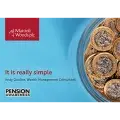As we enter the festive period, the season for giving and spending time with family will soon enough be upon us. Many will be considering gifts more substantial and complicated than those on their grandchildren’s Christmas list. One of the most common queries I receive from clients is “what is the best way for me to make a gift to my grandchildren?”.
As with most financial planning scenarios, the answer to this is highly individual and depends on several factors, including the gift amount, the purpose, the grandchildren and also the grandparents.
Looking at this from the highest level, there are two common approaches:
-
making an outright gift to the grandchildren
-
setting up a trust for the grandchildren
Direct gifting to grandchildren is certainly the simplest means and in a lot of scenarios, the grandchildren will be most grateful for this! There is always the risk that the monies may not be used as the grandparents intended, for example, school or university fees, getting onto the property ladder, or investing prudently for the long term.
Before taking this approach, serious consideration needs to be given to the age, maturity and financial intelligence of the recipient. Having custody of a substantial sum at a young age is a big responsibility given the allure of ‘more exciting’ ways of spending the gift in the eyes of a teenager or young adult.
Another option is a Junior ISA (JISA). This has to be set up by the parents and is one tax-efficient way of gifting monies to grandchildren that we use, with many clients looking to build up wealth for future generations. Any child under the age of 18 who lives in the UK has a £9,000 per year JISA allowance. These function similarly to a typical ISA, with the ability to invest monies and benefit from tax-free investment growth and income.
While the money within the JISA legally belongs to the child, there is a layer of protection to generally prevent withdrawal before the child reaches age 18. At this point the JISA converts to a normal ISA. However, as with outright gifting to children, by having absolute access to the monies at their 18th birthday the funds could still be spent poorly.
Grandparents could always make the gift at the time it is needed; for example, if being used to purchase a property make the payment direct to the solicitor’s client account. However, if one of the advantages of making the gift is the potential inheritance tax (IHT) saving, then waiting until the event might not be the best scenario from a planning perspective and this is why expert advice based on knowledge of the family circumstances is always recommended.
To allow greater control over the gifts made to grandchildren and ensuring that they are put to good use, clients can consider setting up a trust. While this means a layer of detail and paperwork, this can be easily addressed by taking suitable professional advice. The subject of trusts is huge and here we will focus on the simplest structure, an absolute (or ‘bare’) trust.
With a bare trust the beneficiary has absolute entitlement to the trust fund on reaching age 18 (16 in Scotland). In the meantime, these funds can be used to benefit the grandchildren, for example for funding education, school trips, holidays and music lessons. While the money or assets do not need to leave the trust at 18 (or 16 in Scotland), the trustees must distribute the funds should they be requested by the beneficiary. From a tax perspective the grandchild uses their own income and capital gains tax (CGT) allowances, and this often means there may be no tax liability year on year. This is different than if a parent gifts funds to a child, as any income above £100 could be counted as being that of the gifting parent and taxed at their highest rate.
With no limit to the size of funds that can be invested in a bare trust, there is an opportunity to use this gifting as part of an inheritance tax (IHT) planning strategy. Assuming that the gift is cash (rather than assets that may be liable to CGT upon transfer), no tax is due when placing assets into a bare trust. The gift is considered a Potentially Exempt Transfer (PET) with no IHT liability providing the settlor (in this case the grandparent) survives seven years. If death occurs after three years (but before year seven) tapered IHT rates apply to the value of gifted funds exceeding the settlor’s nil-rate band. Grandparents can also make use of other IHT allowances such as the Annual Exemption by giving away a total of £3,000 per individual in each tax year (£6,000 combined for spouses), as well as gifts made from regular income.
On the flip side, the beneficiary cannot be changed once the trust has been established, meaning that in the event of growing families, further grandchildren or changing circumstances, there is no ability to alter those who benefit from an arrangement. In this case a new trust may need to be established. Furthermore, there is still the issue that with absolute entitlement to the monies at age 18/16, the funds may not be spent as wisely as hoped.
If the absolute trust is not the correct structure for your circumstances and family dynamics, there are a wide range of more complex trust structures such as discretionary or interest in possession trusts available that clients can consider. This could be either for greater flexibility for beneficiaries, or for a specific purpose such as providing for a grandchild with disabilities, or simply ensuring that family wealth stays in the family as far as possible.
Ultimately, the best way for gifting to grandchildren depends on your individual circumstances, family dynamics and tax position – and we always recommend that our clients talk to us and seek advice from a suitably qualified solicitor. Perhaps something that is different to wrapping the stocking fillers but if implemented correctly, could provide efficient generational gifting for many Christmases to come!
































































































































































































